
The UK has set out a sweeping new regulatory regime for the cryptocurrency industry that aims to bring the rules governing the issuance, trading and lending of crypto tokens closely into line with those for traditional financial assets such as stocks and bonds.
The proposals to “robustly” regulate the sector, which are subject to a consultation, are the clearest sign yet that the government is determined to transform the UK into a hub for the crypto industry, despite a year of turmoil that saw the value of many popular crypto assets plummet and the collapse of leading crypto exchange FTX. The government’s embrace of crypto comes amid concerns that Brexit threatens London’s dominance as Europe’s leading financial centre.
“We believe that crypto technologies can have a profound impact across financial services,” said Andrew Griffith, economic secretary to the Treasury. “By capitalising on the potential benefits offered by crypto, we can strengthen our position as a world leader in fintech, unlock growth and boost innovation.”
The collapse of FTX in November fuelled calls for tougher regulation of the industry, not least because its failure highlighted the risks presented by exchanges that combine several regulated activities, including facilitating trading, market making, clearing and the custody of customer assets. In traditional finance, these roles are typically doled out to a series of companies.
“It is evident that the shadow cast by high-profile failures through 2022 has influenced the extent and pace of implementation of these measures,” said Albert Weatherill, financial services partner at law firm Norton Rose Fulbright.
Such businesses would be expected to comply not only with the rules governing traditional trading venues but also to take additional steps to safeguard customer funds.
The Treasury also promised a “world-first regime for crypto lending” as it aims to rein in a sector that was at the centre of last year’s crypto meltdown. According to a report published this week by a court-appointed examiner, the now-bankrupt US-based lender Celsius Network misused investor and customer funds for years before its collapse, raising questions over whether watchdogs should have intervened sooner.
Under the proposed rules, regulated crypto lenders would be expected to adequately warn consumers of risks and ringfence retail funds in case of insolvency. A regime for lending activity, the Treasury said, should also consider contingency plans for the failure of a lending platform’s largest market counterparties.
The Treasury is also seeking to regulate activities such as the issuance and custody of so-called stablecoins — tokens designed to track the value of an established currency such as the dollar.
London’s Financial Conduct Authority has supervised crypto asset businesses from an anti-money laundering perspective since January 2020, although more than four in every five applicants have been unable to meet the regulator’s minimum standards for registration.
The FCA’s tough stance on crypto asset businesses, as well as warnings that crypto investors should “be prepared to lose all their money,” has prompted industry fears that London risks falling behind its competitors on digital assets. Some industry participants have argued that the EU’s upcoming landmark Markets in Crypto Assets (Mica) regulation better serves the needs of the sector.
However, the government’s new proposals have rekindled hopes the UK can position itself at the forefront of the digital assets space despite acute turbulence in the industry’s recent history.
“The consultation puts the UK on the right track to realise its global crypto ambitions and provides an opportunity to build on the progressive principles set out by the EU’s Mica legislation,” said Andrew Whitworth, policy director for the Emea region at Ripple, a crypto payments company.






